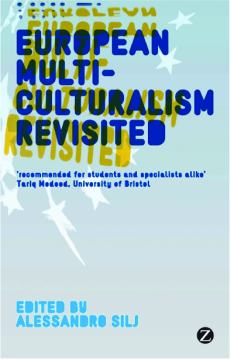
BOOK
European Multiculturalism Revisited
Alessandro Silj | Stephan Lanz | Stefano Allievi | Tina Gudrun Jensen | Professor Malehia Malik | Valerie Amiraux | Thijl Sunier | Christophe Bertossi
(2010)
Additional Information
Book Details
Abstract
European Multiculturalism Revisited analyses the alleged crises of the main ‘models’ of multicultural societies experienced by Europe since the end of World War II, based on research conducted by local scholars in the UK, Denmark, the Netherlands, Italy, France and Germany. Each chapter provides an historical account of how the model developed and was implemented in the country in question, followed by an in-depth analysis of the factors that have led to the claim that the model has failed. The questions being, Did it actually fail? And if it failed was it because of some intrinsic weaknesses or external circumstances?
This volume is a groundbreaking contribution to a topic of vital contemporary importance.
Alessandro Silj is Founder and Director of Ethnobarometer, a European research network on migration and inter-ethnic relations, and author of several books and essays on European affairs and Italian politics. He is also Secretary General, of the Italian Social Science Council (CSS).
'It is good to find a book which is not taken in by a false political rhetoric but is willing to adapt and defend multiculturalism across Europe. This book is to be recommended to students and specialists alike.'
Tariq Modood, University of Bristol
'An excellent overview of the so-called 'crisis of multiculturalism' in W. Europe. The contributors explore beneath the stereotypes, which have dominated public discussion of this 'crisis', to reveal the complex reality of the cultural pluralism produced by global migration.'
John Eade, Centre for Research on Nationalism, Ethnicity and Multiculturalism
'What it brings to the discussion is a wealth of fascinating material grounded in facts: a welcome addition to the literature.'
H.A. Hellyer, University of Warwick and author of Muslims of Europe'
'Written in a refreshing, accessible style the book deserves to be the starting point for any serious academic or policy analysis. An essential purchase.'
Sean Carey, Roehampton University
Table of Contents
| Section Title | Page | Action | Price |
|---|---|---|---|
| Acknowledgements | vii | ||
| Introduction | 1 | ||
| European responses to multiculturalism | 3 | ||
| The crisis of multiculturalism | 9 | ||
| 1 Progressive multiculturalism: the British experience | 11 | ||
| Multiculturalism as a model for minority integration | 12 | ||
| Progressive multiculturalism as a model for minority integration | 20 | ||
| British multiculturalism | 33 | ||
| The emergence of multiculturalism | 50 | ||
| Conclusion | 58 | ||
| Notes | 59 | ||
| References | 61 | ||
| 2 Crisis and new challenges? French republicanism featuring multiculturalism | 65 | ||
| The historical path to colour-, race and culture-blind France | 68 | ||
| Contemporary challenges and the reflexive turn | 80 | ||
| Conclusion | 93 | ||
| Notes | 96 | ||
| References | 99 | ||
| 3 The German Sonderweg: multiculturalism as ‘racism with a distance’ | 105 | ||
| The historical continuity of German immigration policy | 106 | ||
| The recruitment ban and its results | 110 | ||
| From a homogeneous society to multiculturalism | 114 | ||
| After the Kohl era: political reforms of the red–green government | 125 | ||
| The West and the rest: Muslims as the ‘Other’ | 131 | ||
| 'The hype about hybridity': diversity-recognizing multiculturalism | 136 | ||
| Between frontier fortification and hybridity | 141 | ||
| References | 141 | ||
| 4 Multiculturalism in Italy: the missing model | 147 | ||
| From country of emigration to country of immigration | 147 | ||
| The legislative process: how the missing model was built | 149 | ||
| Recognizing cultures through a religious lens? | 160 | ||
| Cultural (in)comprehension: anti-multiculturalism without multiculturalism | 165 | ||
| Conclusion: is no model a good model? | 171 | ||
| Notes | 173 | ||
| References | 177 | ||
| 5 ‘Making room’: encompassing diversity in Denmark | 181 | ||
| Outlines of a Danish model | 184 | ||
| Immigration and integration in Danish politics | 189 | ||
| Cultures as obstacles to integration | 198 | ||
| Authentication or implosion of the Danish model? | 204 | ||
| Notes | 208 | ||
| References | 210 | ||
| 6 Assimilation by conviction or by coercion? Integration policies in the Netherlands | 214 | ||
| The 1980s: cultural diversity as a transitory status quo | 218 | ||
| The 1990s: assimilation in jeopardy? | 222 | ||
| The 2000s: the turning tide | 227 | ||
| The post-Gogh events: the politics of assimilation by coercion | 231 | ||
| Notes | 233 | ||
| References | 234 | ||
| Conclusion: Mistaken models of integration? A critical perspective on the crisis of multiculturalism in Europe | 235 | ||
| Questioning models of integration | 238 | ||
| Revisiting European traditional models | 240 | ||
| The performative effect of models | 243 | ||
| A crisis of integration, really? | 247 | ||
| References | 250 | ||
| About the contributors | 252 | ||
| Index | 255 |
